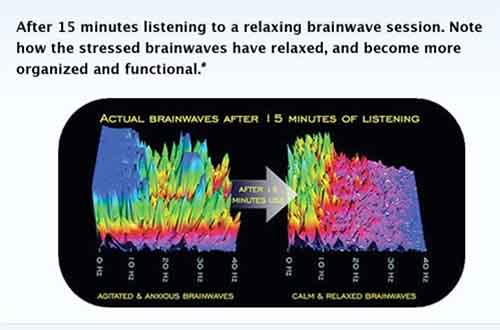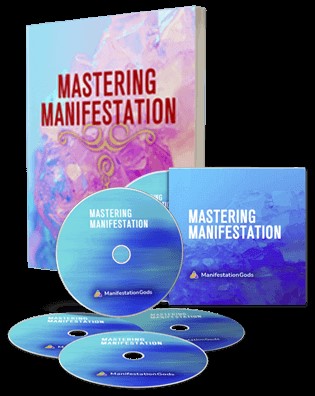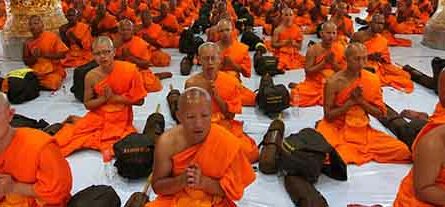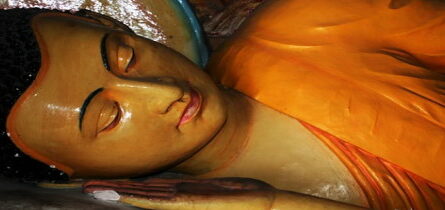There is no absolute consensus on the question Can you meditate after eating? And as with most things in life, there are several factors to consider.
If you are asking this question, likely, you have not yet managed to establish a consistent and ‘easy’ meditation practice.
So what you really want to know is how you can stack as many of the variables in your favor so you will have a good session.
And yes, the time between eating and meditating can have a huge effect on the quality of your practice and the benefits you achieve.
So, let’s explore how eating or not eating, and what you eat before meditating will affect the quality of your practice.
Is It OK To Meditate After Eating?
It is ok to meditate after eating if you are ok with it! However, if you are not feeling comfortable with a full belly before meditating, then simply don’t do it. The quality and quantity of food you consume will affect your outcomes. Those who eat a heavy carbohydrate-laden meal will require more energy for digestion, so less will be available for meditating. Whereas, those who consume a light snack of wholesome foods will notice that it won’t detract too much from their ability to meditate.

Should You Eat Before Meditating, or Will It Cause Me Problems?
Either one of two things will happen if we eat a large meal before meditating.
1) If we cannot yet easily ‘will’ our bodies metabolic processes to slow down, our body will naturally do what it is supposed to do after eating……
…. that is, it will divert our blood flow and energy into the digestive process. And this can be very distracting for beginner meditators as well as some experienced practitioners.
2) If we are experienced meditators, we can actively ‘will’ our bodies metabolism to slow down….. we can slow our rate of breathing and blood flow.
However, focusing on doing this may distract us from what we are wanting to achieve in our meditation session.
Also, we should consider that the reason we ate was that our bodies need nutrition…. And they get it by breaking down the food we have just consumed.
With this in mind, shouldn’t we allow our intelligent bodies to carry out the metabolic processes as they were designed to do, unhindered by our efforts to control them?
If we have just eaten a large meal, the last thing we want is for the food to be sitting in our stomach and intestines for longer than necessary. Doing this regularly may even result in unwanted negative health conditions.
So, I suggest you allow your intelligent body to digest food when it wants to and if you find this distracting, don’t eat before meditating!
Can I Meditate After Eating, or How Long Should I Wait?

From my personal experience, I know that there is no one correct answer. Each day can be different.
However, the optimum time to meditate after eating will depend on the types of food consumed, the quantity of food consumed, as well as your bodies ability to deal with what you have eaten.
Some practitioners recommend waiting a minimum of 30 minutes after eating before mediating. However, a majority suggest waiting for 90 minutes.
When 90 minutes is up, you can be sure that your body has adequately digested your meal. Also, it’s a good length of time because it’s not enough time for you to begin feeling hungry again.
You can then meditate without being distracted by either feeling hunger or the bodies active process of digestion.
A few meditators suggest that your stomach should be empty to achieve the best meditation possible. This would involve waiting for 3 to 4 hours after eating.
However, if you begin feeling hungry before this length of time, the feeling of hunger may be a distraction and hinder your meditation session.
Eating Large Meals Before Meditating Is Never A Good Idea!
Our bodies require energy to digest food, and if we eat a big meal, it will take time to digest. This is time when our energy and blood are being diverted to our stomachs and intestines for digestion.
Therefore, our bodies are actively engaged in a physical process….. which is not what we want to be happening when we are meditating.
More energy diverted to the process of digestion means that less energy and blood are available for our brains. And this is typically why many people become drowsy after eating large meals, especially if they are loaded with carbs.
Meditation is all about the brain and our mental processes. And to have a good session, we want our brains to be energized and our minds to be sharp and focused, not drowsy.
Therefore, eating large meals, especially heavy, card-loaded meals that leave you feeling uncomfortably full and drowsy, is not a good idea before meditating.
What Foods Are Best To Avoid Just Before Meditating?
If you are going to eat before meditating, it’s best to avoid foods that are high in carbohydrates. These include bread, potatoes, pasta, and rice. The reason is that carbs give you a pretty quick boost of energy that makes you feel good, and then you are left feeling drained shortly after.
Food loaded with sugar should also be avoided as it will give you a drastic spike in blood sugar levels, leading to drowsiness and lethargy. So avoid things like soda drinks, sweets, and baked goods as consuming them will leave you feeling drained and lacking focus.
If You Want To Eat, What Are The Best Foods To Eat Before Meditating?
If you feel like you need to eat before meditating, it is best to consume a smaller meal consisting of foods that are nutritious and easily digestible.
Consuming small amounts of fruits and vegetables is the best option. These natural foods are packed with real ingredients (vitamins and minerals) that our bodies need for optimal health and wellbeing.
Therefore, they provide us with the best source of energy (that nature made for us) for the proper functioning of our whole being, mentally, physically, and emotionally.
Other healthy food options that will have a minimal impact on your ability to meditate include nuts and whole grains. Really, any foods that are high in healthy fats, moderate in protein, and low in carbs are ok. They will not cause an uncomfortable spike in your blood sugar levels and so will not leave you feeling drowsy.
Is Meditating While Eating A Thing?
Being mindful while eating or doing any activity is a great way to cultivate self-awareness, develop your connection to the process of life, and advance your spiritual practice.
Mindfulness while preparing and eating your food has many benefits and is a great way to meditate.
Our bodies are made out of the constituents we put into our mouths. So literally, we are what we eat!
The food and drinks are broken down into base components and we use some of them for our bodies growth and maintenance, and discard the stuff that our bodies don’t need.
If we can remain aware of our emotions and physical sensations while going through the process of preparing and consuming foods, we will naturally steer ourselves towards greater mental, emotional, and physical wellbeing.
Focused awareness also keeps us accountable for what we are eating and how much we are eating. And this is really beneficial if we are trying to lose weight or break bad habits like binge eating and snacking.
So why not give it a try?
To Sum up
 Should we eat before meditating?….
Should we eat before meditating?….
As you can see there are various things to consider.
However, at the end of the day, it comes down to you as an individual.
Are you someone who has not yet established a solid practice and is easily distracted? If yes, then avoiding eating for 90 to 120 minutes before meditation is probably the best way to go for you.
However, if you can easily slip into a meditative state, regardless of what distractions may be trying to stimulate your senses, then don’t worry about it. Just do your meditation.
If the only time you have for meditation is after eating, I would still do it even if you are initially distracted by lethargy, a full stomach, or any other sensations.
Why? Because, one of the aims of your meditation practice is to learn how to withdraw your senses from the distractions of the outside world and focus on your internal world of thoughts, feelings, and sensations.
And with more experience, you will understand that meditation is about ‘seeing things as they are.’
With this in mind, when meditating with a full stomach you will come to ‘know’ what that is. And when you meditate on an empty stomach, you will come to ‘know’ what that is.
They won’t be the same thing, but hopefully, you will have learned that it is the experience that is important and not the preference for one state over the other.
Do Your Eyes Water When You Meditate? Check out my post HERE to find out why and what you can do about it.





